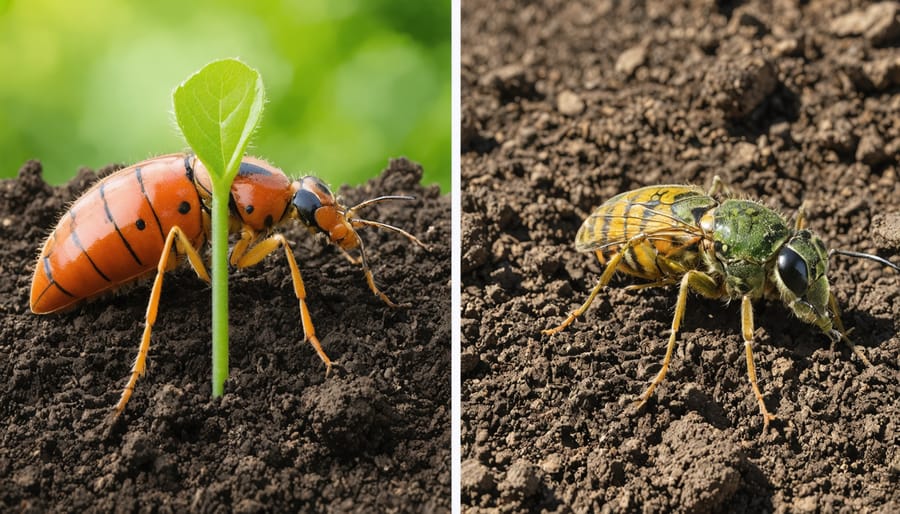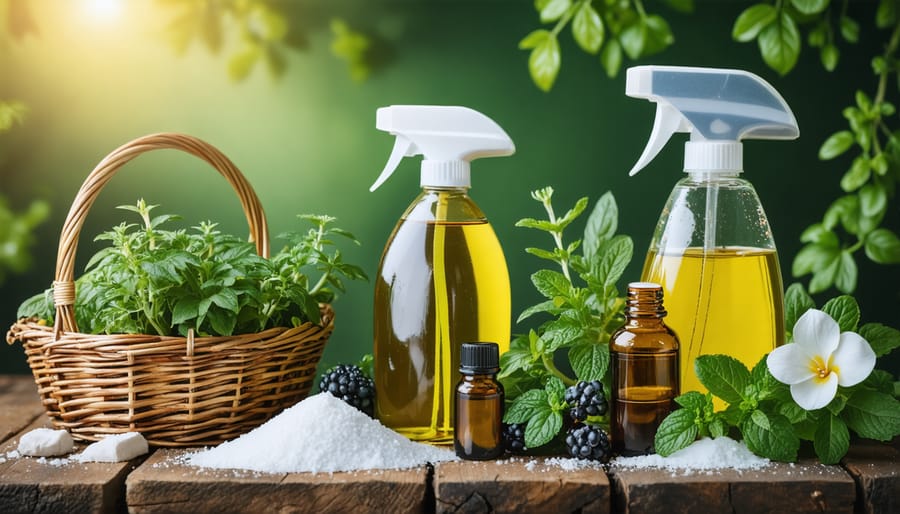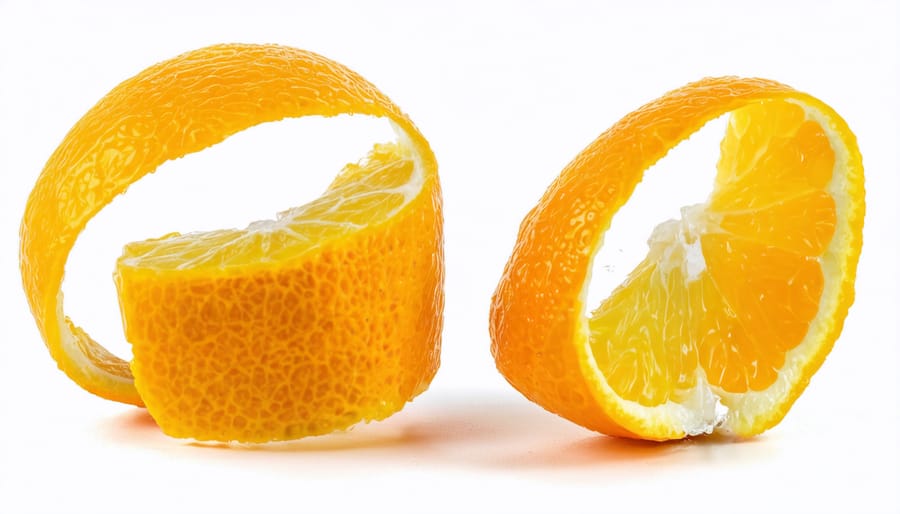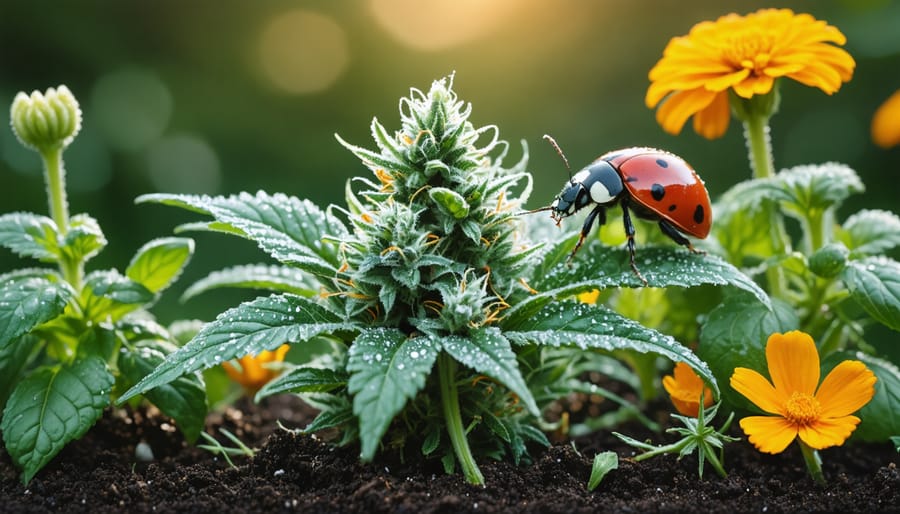Transform your garden maintenance routine with natural, eco‑friendly cleaning supplies that protect both your plants and the environment. Mix equal parts white vinegar and water in a spray bottle for cleaning tools and equipment, preventing rust while eliminating harmful bacteria. Create an effective natural disinfectant by combining one cup of hydrogen peroxide with two cups of water, perfect for sanitizing pots and containers without leaving toxic residues. Harness the power of baking soda paste to scrub stubborn dirt from garden implements, ensuring your tools remain in prime condition while adhering to sustainable gardening practices. These simple, organic solutions not only maintain garden hygiene but also preserve beneficial soil microorganisms and protect pollinators essential for a thriving garden ecosystem. By choosing natural cleaning alternatives, you’re creating a healthier environment for both your plants and local wildlife while reducing chemical runoff into groundwater systems.
Why Commercial Cleaning Products Can Harm Your Garden
Hidden Chemicals That Damage Plant Health
Many common household cleaners contain harsh chemicals that can harm your garden’s delicate ecosystem. Sodium hypochlorite, found in bleach-based cleaners, can kill beneficial soil microorganisms and damage plant roots if it leaches into your garden beds. Ammonia, a frequent ingredient in glass and bathroom cleaners, can alter soil pH and interfere with nutrient absorption. Even seemingly innocent air fresheners often contain phthalates, which can accumulate in soil and affect plant growth.
Phosphates, common in many detergents, can cause excessive algae growth when they enter water systems, while triclosan, found in antibacterial products, has been shown to inhibit beneficial fungal growth in soil. Synthetic fragrances and dyes might make cleaners smell and look appealing, but these petrochemical-based additives can persist in soil for months, gradually weakening plant health and reducing crop yields.
Being aware of these hidden chemicals is the first step toward protecting your garden’s health and choosing safer alternatives.
Environmental Impact on Your Garden Ecosystem
Chemical cleaning products can have far-reaching consequences on your garden’s delicate ecosystem. When these harsh chemicals seep into the soil, they disrupt the natural balance of beneficial microorganisms that are essential for soil health. Just like a thriving neighborhood needs all its residents to function well, your garden relies on countless tiny organisms working together.
Think of your garden soil as a bustling underground city. Beneficial bacteria, fungi, and earthworms all play crucial roles in breaking down organic matter and making nutrients available to your plants. Chemical cleaners can act like a natural disaster in this microscopic community, potentially killing off these helpful organisms and creating long-lasting imbalances.
Beyond the soil, these chemicals can harm pollinators, beneficial insects, and even the protective coating on plant leaves. By choosing organic cleaning alternatives, you’re not just maintaining a clean garden – you’re preserving the intricate web of life that makes your garden flourish naturally.


Effective Organic Alternatives for Garden Tool Cleaning
Vinegar-Based Cleaning Solutions
White vinegar is a powerhouse in organic gardening, offering an effective and eco-friendly cleaning solution for various garden tools and supplies. Mix equal parts white vinegar and water for a basic all-purpose cleaner that’s perfect for scrubbing plant pots, trays, and hand tools. For tougher jobs, like removing mineral deposits from watering cans or cleaning rusty tools, use undiluted vinegar and let items soak for 24 hours.
Create a heavy-duty cleaning solution by combining one cup of vinegar with two tablespoons of baking soda and a few drops of natural liquid soap. This mixture works wonders on greenhouse glass, garden furniture, and stubborn dirt on tools. For cleaning delicate garden sprayers and misters, use a gentler solution of one part vinegar to three parts water to prevent damage to rubber seals.
I’ve found that adding a few drops of lavender or tea tree essential oil to vinegar solutions not only improves the smell but also adds natural antimicrobial properties. Remember to always test your vinegar solution on a small area first, especially when cleaning painted surfaces or specialized garden equipment.
Essential Oil Disinfectants
Essential oils offer a powerful, natural way to sanitize your gardening tools while maintaining an organic approach. Tea tree oil, with its potent antimicrobial properties, stands out as a go-to option for keeping tools clean and disease-free. Create a simple disinfectant solution by adding 15-20 drops of tea tree oil to a spray bottle filled with water and a splash of white vinegar.
Other effective essential oils for tool sanitization include lavender, thyme, and eucalyptus. These oils not only clean but also leave a pleasant natural scent. For pruning tools that come into direct contact with plants, combine 10 drops each of tea tree and lavender oils with water in a small spray bottle. This mixture helps prevent the spread of plant diseases while being gentle on your garden ecosystem.
Remember to spray and wipe down your tools after each use, paying special attention to blades and joints where debris can accumulate. Store your essential oil solution in a dark bottle to maintain its effectiveness, and refresh the mixture monthly for best results.
Baking Soda Scrubs
Baking soda is a gardener’s best friend when it comes to natural cleaning solutions. This versatile powder acts as a gentle yet effective abrasive that’s perfect for scrubbing garden tools, pots, and equipment without causing damage or leaving harmful residues. To create a basic cleaning scrub, mix baking soda with just enough water to form a paste. For tougher jobs, add a few drops of liquid castile soap to boost cleaning power.
This natural scrub works wonders on rusty tools, stubborn dirt on terra cotta pots, and grimy garden furniture. Simply apply the paste with a brush or cloth, scrub gently, and rinse thoroughly. For wooden handles on garden tools, the mild abrasive nature of baking soda helps remove dirt while preserving the wood’s integrity.
As an eco-friendly option, baking soda scrubs are safe to use near your plants and won’t contaminate soil or water sources. Plus, any residue that makes its way into your garden actually helps balance soil pH levels, making it a truly garden-friendly cleaning solution.
DIY Organic Greenhouse and Garden Furniture Cleaners
Citrus-Based All-Purpose Cleaner
Turn those leftover citrus peels into a powerful, natural cleaning solution for your garden tools and surfaces! After enjoying oranges, lemons, or grapefruits, save the peels to create an effective all-purpose cleaner that’s both eco-friendly and budget-conscious.
To make your citrus cleaner, fill a large glass jar with citrus peels and cover them completely with white vinegar. Seal the jar and let it sit in a cool, dark place for about two weeks, allowing the citrus oils to infuse into the vinegar. Strain the liquid and dilute it with equal parts water in a spray bottle.
This natural solution works wonderfully on garden tools, greenhouse windows, potting benches, and even outdoor furniture. The citrus oils help cut through dirt and grime while leaving behind a fresh, natural scent. For tougher jobs, use the solution undiluted directly on problem areas.
I particularly love using this cleaner on my pruning shears and trowels – it removes sticky plant residue effectively without leaving harmful chemical residues that could affect my plants. Plus, the antimicrobial properties of citrus help prevent the spread of plant diseases between different areas of your garden.
Remember to label your cleaning solution clearly and store it away from direct sunlight to maintain its effectiveness. Make a fresh batch every few months to ensure the best cleaning power.

Natural Mold and Mildew Solutions
Dealing with mold and mildew in your garden space doesn’t require harsh chemicals. Nature provides several powerful solutions that are both effective and environmentally friendly. White vinegar is your first line of defense – mix equal parts water and vinegar in a spray bottle for a potent mold-fighting solution that’s safe for your plants and garden tools.
Tea tree oil is another fantastic natural fungicide. Add 10 drops to a cup of water, and use this mixture to clean garden pots, tools, and surfaces. The antimicrobial properties of tea tree oil make it especially effective against stubborn mold spots.
For preventive measures, sprinkle baking soda around areas prone to mold growth. It naturally absorbs moisture and helps maintain a balanced pH level. I’ve found that sprinkling it around the base of my greenhouse walls has significantly reduced mold issues during humid seasons.
Hydrogen peroxide (3% solution) mixed with water creates an oxygen-rich environment that mold simply can’t thrive in. Use one part hydrogen peroxide to two parts water for cleaning garden tools and workbenches.
Don’t forget about sunlight – it’s nature’s most powerful mold deterrent. Whenever possible, allow your garden tools and containers to dry in direct sunlight after cleaning. For indoor growing spaces, improve ventilation by using small fans and keeping doors open when weather permits.
These natural solutions not only keep mold at bay but also protect beneficial microorganisms in your garden soil that chemical cleaners might harm.
Maintenance Tips for Long-Term Garden Health
Regular maintenance of your garden tools and spaces is essential for a thriving organic garden. Start by establishing a cleaning routine after each gardening session – a quick wipe-down of tools with a natural vinegar solution (1 part vinegar to 3 parts water) prevents rust and removes soil buildup. For wooden handles, apply a light coat of linseed oil monthly to prevent splitting and extend their life.
Create a dedicated cleaning station in your garden shed or workspace with natural cleaning supplies readily available. Keep a bucket of sand mixed with vegetable oil near your tools – simply plunge tools into this mixture after use to clean and protect them simultaneously. This old-gardener’s trick has served me well for years!
For larger garden spaces, maintain clear pathways using organic mulch or wood chips, which naturally suppress weeds while keeping areas tidy. Regularly inspect your compost bin, turning it monthly and ensuring proper moisture levels for optimal decomposition.
Consider making your own tool sanitizing spray using tea tree oil and water (10 drops per cup of water) to prevent disease spread between plants. Store tools hanging or upright in a dry location, and inspect them seasonally for any needed repairs or maintenance.
Remember to clean garden containers and pots between plantings using a gentle solution of castile soap and warm water, followed by a thorough rinse. This organic approach maintains garden health while protecting beneficial soil microorganisms.
Embracing organic cleaning supplies in your garden is more than just a trend – it’s a commitment to both your garden’s health and our planet’s future. By choosing natural alternatives like vinegar, baking soda, and essential oils, you’re creating a safer environment for beneficial insects, protecting your soil’s microbiome, and growing healthier produce. These eco-friendly solutions are not only effective but also budget-friendly, making sustainable gardening accessible to everyone. As you continue your gardening journey, remember that every small choice matters. From selecting natural pest deterrents to using biodegradable cleaning tools, you’re contributing to a greener, more sustainable future. Let’s nurture our gardens naturally, keeping them clean and thriving while preserving the delicate balance of our ecosystem for generations to come.





